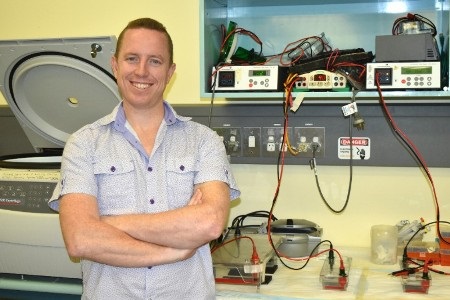Oct 14 2015
Researchers at Sydney’s Centenary Institute are working on a new treatment aimed at “starving” breast cancer cells, following the discovery of a significant link between breast cancer and nutrition.

Associate Professor Jeff Holst, Head of the Centenary Institute's Origins of Cancer Program.
Associate Professor Jeff Holst and his team at the Centenary Institute have shown they can stop breast cancer cells from growing, by blocking the proteins that pump key nutrients into the tumour cells.
This method has now proven to be effective in preventing the growth of melanoma, prostate cancer and breast cancer cells.
The key nutrient of interest in this study, glutamine, is abundant in meat and dairy products. It is also produced naturally in the body, thus a change in diet alone is not sufficient to starve the cells. The Centenary Institute is working on drugs to block the nutrient pumps that allow glutamine to be absorbed by the cancer cells.
Associate Professor Holst said there is strong evidence to support a link between nutrition and cancer, and this new discovery demonstrates a way to tackle it.
“African and Asian women have significantly lower rates of breast cancer. However, upon moving to western nations and consuming the western diet, rates drastically increase,” Associate Professor Holst said.
“Unlike normal cells, many cancer cells rely on glutamine instead of glucose for the energy they need to divide and grow. We have discovered a way to stop tumours from growing by starving them of this essential nutrient.”
Associate Professor Holst said this research also offers new hope for treating the highly aggressive “triple-negative” subset of breast cancer.
“Not only did we find that triple‐negative breast cancer cells have more glutamine pumps on their surface, but also that blocking these pumps stopped the tumours from growing.”
This study was conducted using cell and animal models and was today published in the world-renowned journal Oncogene. The team at the Centenary Institute are now working to develop drugs that can be used to block these pumps in humans.
This research was made possible by the generous support of the National Breast Cancer Foundation, its donors and contributors. The Centenary Institute thanks the National Breast Cancer Foundation for its ongoing support of the Origins of Cancer Program.